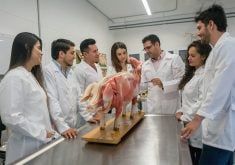DRINKWATER, Sask. – The Thuls don’t know who to thank for nominating them as the 2007 farm family of the year for the Moose Jaw Exhibition in Moose Jaw, Sask., but they are appreciative.
It was a nice event, said Rhonda Thul of the Feb. 23 banquet. Moose Jaw has been presenting the award since the 1880s to local farm families. Doug Thul joked that most of the people he knows who have received the award are dead now, but he was more serious in his acceptance speech.
“We are no different than any other farm family out there. We would like to see agriculture become a viable career choice for our younger generation.”
Read Also

Fuel rebate rule change will affect taxes and AgriStability
The federal government recently announced updates to the fuel rebates that farmers have been receiving since 2019-20.
That includes their son Tyson, 15, and daughter Tianna, 13.
The Thuls have other reasons to thank their community.
When a plow wind blew a grain bin onto their deck and a corner of the house in 2000, the community came out to help clean up.
The community also comes out to the regular social occasions in Drinkwater and Briercrest that help bind together the farmers who remain in the district southeast of Moose Jaw. These events are increasingly important as farms grow larger, families become smaller and neighbours more scarce.
Then there was the community help the couple received 15 years ago when Rhonda was injured in a snowmobile accident. The accident left her in a wheelchair so family and friends helped tear down the Thuls’ farmhouse to build a larger, more accessible one.
The family spreads its efforts several ways. They crop 3,500 acres near Drinkwater and keep 160 commercial cows on a 3,000 acre ranch 40 minutes away. Both operations used to be owned by their respective parents.
Rhonda grew up near Old Wives Lake in southern Saskatchewan where she rode horses, competed in horse shows and joined 4-H beef and horse clubs. In 1981, she competed in Miss Rodeo Canada.
Besides raising the children, Rhonda keeps the farm’s books, runs errands and serves on many committees. She is a member of the local school board, treasurer for the Drinkwater Community Club and a 4-H leader. Last fall the Thuls’ farm served as a site for a pilot of a new 4-H club activity – trap shooting.
Besides 4-H, Tyson curls, snowmobiles, hunts and helps drive the tractor and combine. Tianna shares interests in curling, snowmobiling and 4-H and also takes dance lessons.
Their grandfather sold most of the Drinkwater farm when Doug, one of eight children, was still in school. However, Doug acquired the farming bug by custom combining with his father in the United States.
Doug bought the home quarter from his father and began farming in 1982. Four years later, he and Rhonda were married. Doug laughs that his father retired right after he paid off the farm.
“I always bug Dad that I’ve farmed longer than he did.”
He said pulse crops have been the farm’s saviour. The family grows lentils and peas in rotation with wheat. Moisture is not bad in the area and Doug expects to be seeding by May 1. He and Rhonda are still debating whether to grow chickpeas this year.
But Doug is busy on more than his farm. He and two other farmers share the labour on their farms, depending on whose crop is ready or where it rained the previous night. He also does custom farming on 1,000 acres and works with Simpson Seeds.
Doug isn’t interested in working with livestock so the family contracts the management of the cattle operation.
While the grain farm hires employees and Tyson helps out, Rhonda said Doug still works long hours.
“Through seeding we’ll run the clock, with some help,” he said.
Last year he worked with a group of six rural municipal councillors to convince RMs in their region to raise money for a producer-owned ethanol plant. However, they couldn’t convince a solid block of the municipalities to go ahead.
The Thuls have also been involved in a couple of contentious issues.
They fought the closure of their local school and when it did close, chose to drive their children to school in Moose Jaw rather than send them to the closest rural school.
Doug has also been a vocal supporter of marketing choice during the barley plebiscite.
“Most people don’t understand that to grow a crop we make all the decisions, but can’t (have the authority to) decide where to sell it.”
Ask the Thuls where they see themselves 10 years from now and Rhonda says hopefully somewhere without winter because “snow and wheelchairs don’t go together.”
As for Doug, he hopes to see the family’s next generation farming because “that’s what it’s all about.”














